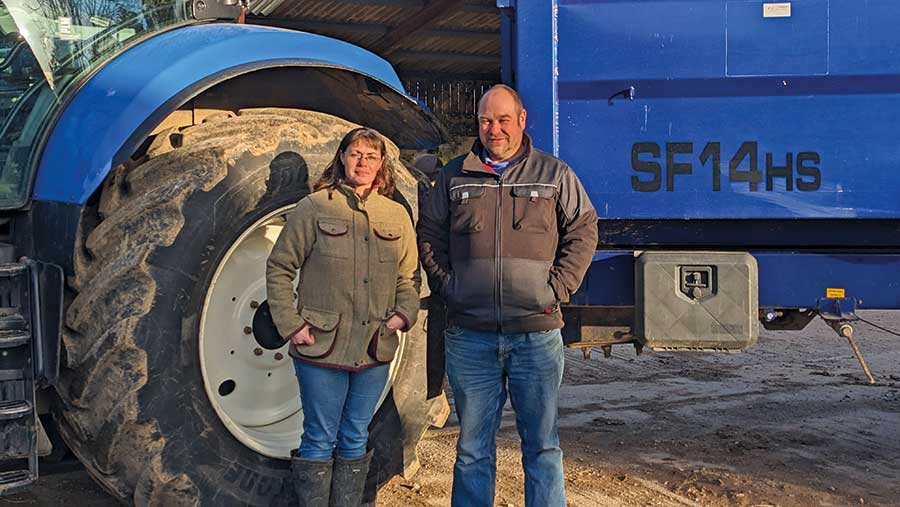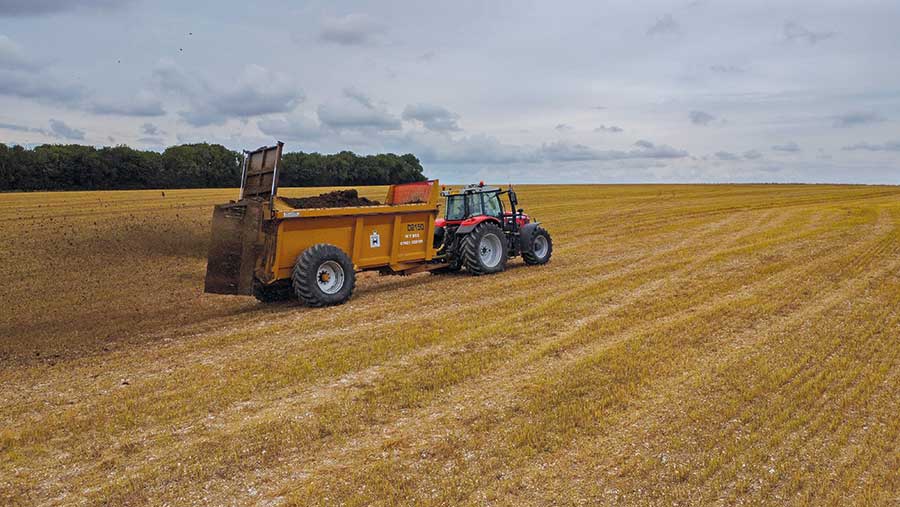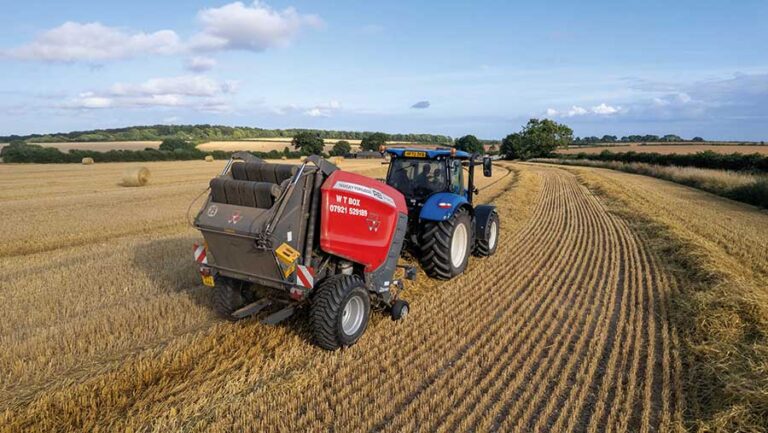According to Will Box and his wife Laura, who own and run WT Box Agricultural Services, their success comes from working with other people.
In 2008, they were working full-time jobs, balancing this with a 12-acre smallholding and 30 sheep, taking on the fencing, husbandry, and lambing responsibilities that this entailed.
See also: Scottish estate puts Grange toolbar to work
Will was working with some other farms, driving a 6610 Ford tractor, and offering conventional square baling, as well as doing some trailer hauling when he could. In 2012, he felt like it was now or never, and took the plunge, leaving his job and setting himself up as a contractor.
He traded in the 6610 against a second-hand Massey Ferguson 6290 and started working full time with other contractors in the area to build a customer base.

“Sub-contracting allowed me to build up some capital and invest in machinery gradually,” Will explains. “I carried on hauling trailers and jumping on the seat to fill any gaps my customers had, including bale wrapping, and this meant that by 2014 I could start adding equipment to my fleet.”
The 6290 was upgraded to a brand-new Massey Ferguson 6616, and he invested in a plough and power harrow to expand operations into seedbed preparation.
By this point, the bulk of the work was coming from a dairy farmer, who brought Will in to help with most tasks, from stock handling during TB testing to crop establishment and grain haulage.
Spreading the risk
When this customer made the decision to step away from farming, it meant building the business back up again. “The situation had worked for us previously, but when we lost that work it showed the importance of spreading the risk.”
Since then, Will says he has been constantly trying to grow the business, adding new operations and new customers. “Sub-contracting is great, but it also has risks because you’re only there when you’re needed, which means in a dry year, when everyone is able to get on the ground and do the work themselves, you can be left out.”
Laura adds that Will thrives on the pressure. “He loves been busy and he has built a reputation with his customers by being honest with them. He’s clear about what his workload is and when he will be able to get there, and if something unexpected happens, he lets them know.”

In 2016, he started working on the La Lee Estate near Blandford Forum, Dorset, continuing to build the contracting side at the same time.
“They’d previously used students on the farm, but had made the decision to take on someone who could help out year-round.”
By 2022, the relationship with the estate was such that Will, Laura and their children, Charlotte and James, were able to move into a home on the premises, with space for Will to store equipment.
The estate was accommodating enough to build a bespoke workshop for Will so that he could maintain his equipment over the winter. While this arrangement is similar to the previous one, Will says he has made efforts to spread the workload across more clients.
“About 60% of the work comes from the farm, and one or two larger customers,” he explains. “The rest is made up of returning and new customers, who I might do two or three jobs a year for, as well as bale deliveries for equine customers.”
The equine side developed out of the conventional bales that Will started his contracting career with. While these were dropped from the workload in 2019, due to the time required to haul and stack them – Will notes that he had reached a point where he either needed to stop or invest heavily in an accumulator – he continues to supply stables with round and large square bales.

Round bales are made with a Massey Ferguson round baler. Will rents a small patch of ground to make his own hay and haylage for his equine customers, while a contract to bale meadow ground for the National Trust sees about 400 bales of silage each year, with any excess being taken by Will for his own use.
Last year, he added a Krone large square baler to the mix, increasing the offering to his customers.
Always on the lookout for other opportunities, Will is now trialling a new enterprise that will use any waste bales. “We’re composting these down to offer a cost-effective way for our customers to boost nutrients and organic matter in their soil.”
The middleman
Working between several big farms, as well as other contractors, Will has been able to act as a middleman and arrange various deals. These include swapping muck for straw, which not only helps both customers, but also provides additional work for Will.
“Sometimes you have to make yourself work,” he said. “I get the task of hauling the straw and muck between the farms, which provides winter work alongside the maintenance and bale deliveries.”
The workload has now got to a point where Will has been able to hire an additional worker, Matt Fall, who has experience with both engineering and farming and has proved an asset to the business. Laura continues to work with Will, handling the accounts for the business while also working part time.
The addition of Matt to the business was not just an opportunity to increase the amount of work that could be taken on. It also made Will take a close look at the running costs of the business.
“It made me think about the cost of owning my tractors,” he said. “When I worked it out, owning a tractor was costing £14.50/hour just in depreciation, before I added any of the other costs to it. And it requires a substantial amount of capital upfront.”
Having already hired in a New Holland T6.180 previously for Matt, he has now worked out a deal to hire in two T7.225s, each of which he predicts will cost just £14.10 per operational hour, including servicing. The freed-up capital from selling the Massey Ferguson has enabled him to invest elsewhere. The 2024 mowing will now be done with a set of Kuhn triple mowers with grouper attachments.
“That has to be future for silage mowing,” he said. “With the hotter, drier seasons, we’re sometimes struggling to keep up with the silage because it’s dry almost as soon as you mow it. It also means we can spread the workload across different customers, with one of us using the triple mowers and following up with the baler, and another going out with the trailed mower and following up with the rake for drier crops.”
The Kuhn mowers will also bring other opportunities, with another contractor working with a trailed forager. “He’s filling in gaps between the self-propelled foragers in the area and has picked up some work near me, so having the triple mowers and groupers will work well with that.”
The capital saved was also put into a Pichon slurry tanker and dribble bar. Will had previously offered slurry spreading with a Joskin tanker back in 2014, but came out of this to focus more on the baling. “Now that more customers are looking seriously at the cost of fertiliser and how to use their slurries more effectively, it seemed like the right time to reinvest.”
While Will and Laura are more secure now thanks to the expansion of the business, Will concludes by saying that nothing is off the table for them. They’re open to all opportunities.
“I think everyone wants to be able to leave something for their children, and that’s what this business is. This will be here for Charlotte and James, if they want it.”


